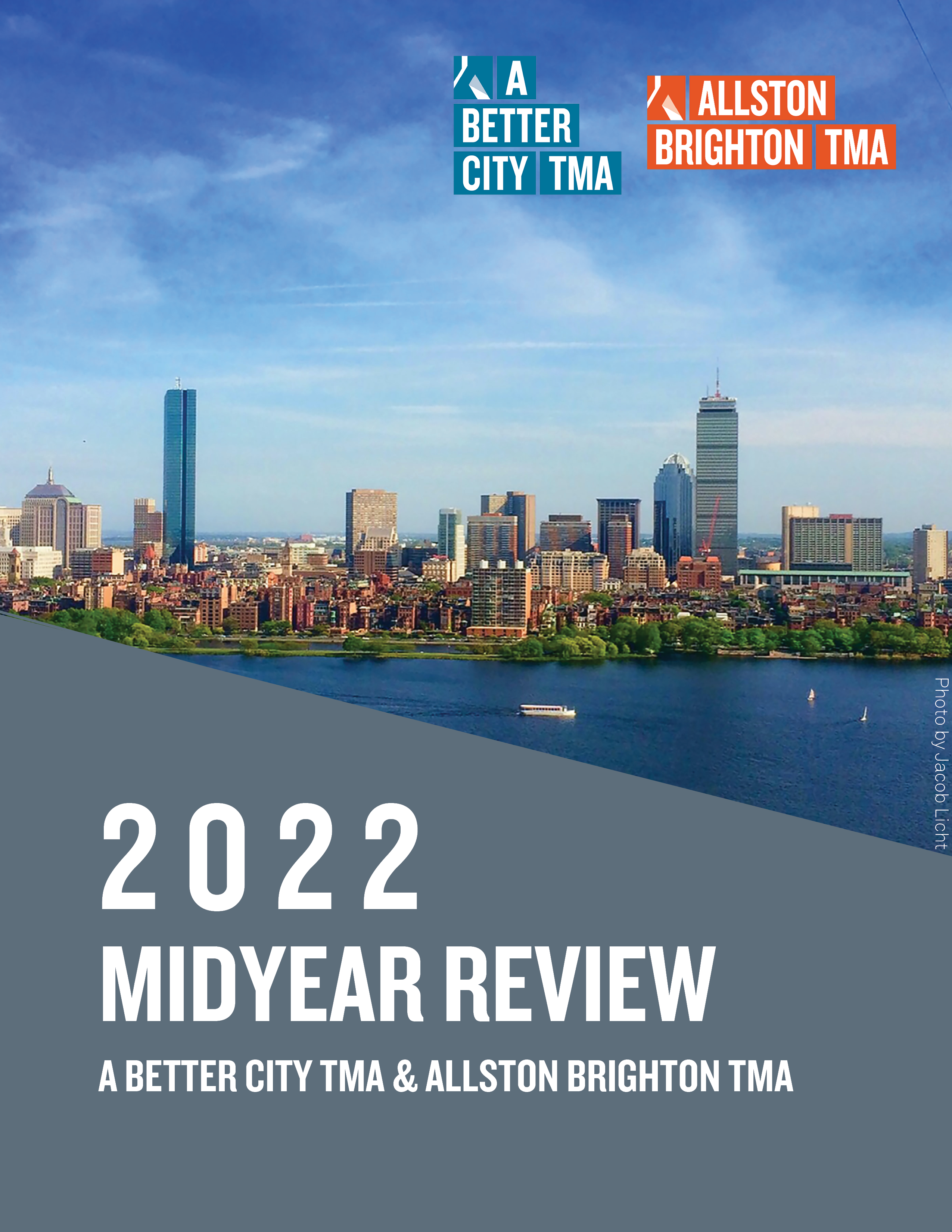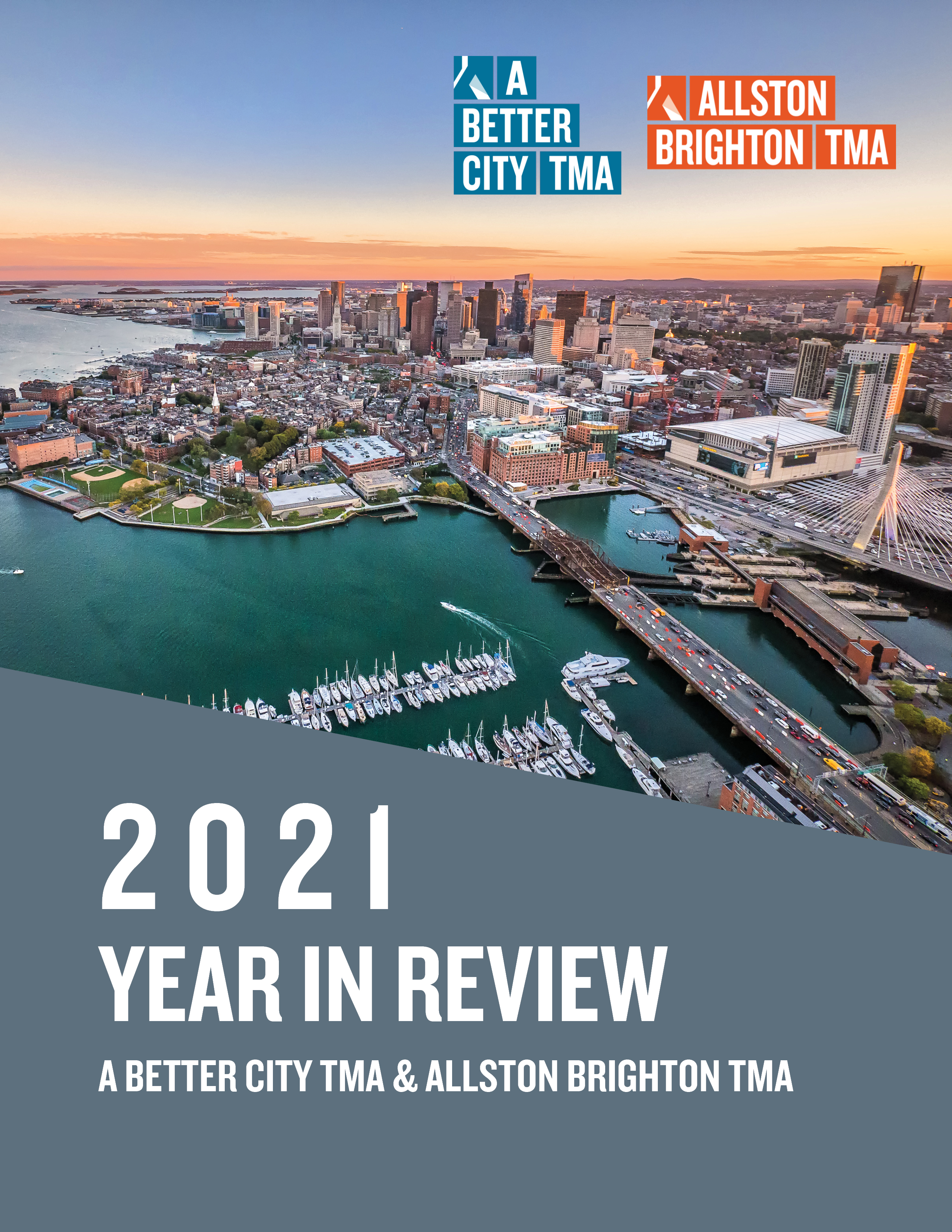| Focus Areas | Equity in the Built Environment | Greenway Business Improvement District | Transportation Management Associations | Accomplishments |
A Better City operates two Transportation Management Associations in the Boston area: A Better City TMA and Allston Brighton TMA. The Transportation Management Associations (TMAs) are non-profit membership organizations made up of employers, developers, and property managers working together to address transportation, air quality, and commuter issues in a defined geographic area. TMA services can help reduce the number of drive-alone commuters, minimize vehicle emissions, and improve access to transportation options. Our TMAs provide commuting programs, incentives, and advocacy to our members to help employees and tenants commute more sustainably.
A Better City’s two TMAs aim to enhance the economic vitality of the areas served by improving mobility and air quality through incentives, programs, events, and advocacy that promotes sustainable commuting. Our TMAs also assist TMA members in meeting the requirements of the Massachusetts Department of Environmental Protection Rideshare Regulation and the City of Boston's Transportation Access Plan Agreements (TAPA).

Mission, Goals, & Objectives
Mission
To enhance the economic vitality of the areas we serve by improving mobility and air quality through incentives, programs, events, and advocacy promoting sustainable commuting.
GOALS & OBJECTIVES
-
To stimulate the development and implementation of Transportation Demand Management (TDM) programs by businesses, institutions, property managers and neighborhood residents.
-
To develop, promote, and implement transportation services that reduce traffic congestion and improve air quality by increasing the use of sustainable transportation options.
-
To provide members with the means to comply with state and local regulations concerning transportation and the environment; including the Massachusetts Department of Environmental Protection Rideshare Regulation and the City of Boston’s Transportation Access Plan Agreements.
-
To share resources and expertise in advocating, developing, coordinating and promoting sound TDM measures.
-
To disseminate information related to available and future TDM programs and initiatives, as well as, emergency traffic and transit service directives.
A Better City
A Better City TMA was established in 1996 and serves the neighborhoods of Charlestown, West End, North End, South End, Downtown, Chinatown, Back Bay, and Fenway Kenmore. In May 2021, A Better City TMA’s service area expanded to include members formerly served by TranSComm TMA, which was established in 1993.
Commuters who work at any of our member employers, or live and work at member properties are eligible for TMA commuter services. To see the full list of A Better City TMA members, visit our membership page.
Allston Brighton
Allston Brighton TMA was established in 2014 to serve the Allston and Brighton neighborhoods. The Allston Brighton TMA also oversees the Consolidated Shuttle Service, serving shuttle partners and increasing mobility throughout the neighborhood.
Commuters who are employees of member employers, or live and work at member properties are eligible for TMA commuter services. To see the full list of Allston Brighton TMA members, visit our membership page.
GoMassCommute
GoMassCommute is our online platform to administer mobility benefits and programs for your people. Each of our Partners has a unique network where their people can sign up for free to access any of our Commuter Programs, log the trips they have taken, access incentives and promotions, participate in raffles, and more.
As employees track their MBTA, bicycle, walking, driving, or telecommute trips each day in the trip logger, this trip data becomes available in the network management dashboard in GoMassCommute. Key datapoints include mode of each trip, distance traveled, time of travel, estimated GHG emissions saved (as compared to driving), and more. By increasing your workforce’s usage of GoMassCommute, you can uncover hidden trends and unique insights on what kinds of transportation options are most popular and impactful, which helps with resource allocation decisions.
Commuter Services
After registering on GoMassCommute, commuters can access the full suite of programs and promotions available to them as a TMA commuter. Our TMAs offer robust TDM programming and benefits, including:
- Customized Mobility Support: By deeply engaging with our Partners, we develop site sensitive TDM strategies to set specific mobility goals, and push to achieve them. Along the way, our team collects data to evaluate performance, makes modifications as needed, and then amplifies successful programs across our Partners. Let’s innovate together!
- Bike Benefits: Our most popular programs are those related to bicycling, and we are proud to offer several types of bicycle benefits that enable and encourage this efficient, healthy, and sustainable mobility option. We offer bike expense stipends, bike repair clinics, and roadside bike repair benefits to our Partners.
- Traditional TDM Support: We offer the Guaranteed Ride Home program, providing peace of mind with a free Uber ride per for Partners who experience a qualifying emergency while trying something different. We also offer multiple incentive programs meant to encourage modeshift for the first time. Built into our GMC platform are tools to support express buses, ferries, and car or van pooling.
- Data Analysis: We use a data-driven approach to inform our strategies and build our commuter services and programming to best meet your transportation and sustainability goals. As outside experts on Transportation Demand Management (TDM), our data tools visualize your unique mobility patterns and uncover the distinct areas of opportunity within your organization. We overlay that information with the MBTA and Bluebikes systems, design targeted interventions for your distinct user-groups, and make specific cost-projections for each. Our goal is to help you best leverage your resources to foster robust Return to the Office (RTO) adoption while reducing greenhouse gas emissions (GHGs) and roadway congestion. Explore our TDM Data Tools here to learn more about what you have access to as an A Better City Mobility Partner.
Accomplishments
 2024 YEAR IN REVIEW
2024 YEAR IN REVIEW
November 2024 - We believe the future of mobility in greater Boston will be a blend of active and public modes of transportation. With the MBTA settling into a more reliable operational space and the network of separated bicycling facilities becoming increasingly interconnected and robust, the table is set for a meaningful shift toward greener mobility options that focus on moving people to and through our downtown, our neighborhoods, the region. Our ZIP Analysis Tool has shown again and again that most of us aren’t traveling that far between our homes and where we work, study, play and conduct our day to day lives. If even a small portion of us chose to combine active and public transit modes, the collective impact would be huge. And so we offer this year-end summary of the work we’ve done as a reminder to us all that we are making a difference, we are having an impact, and in 2025 we are going to push ahead even further with you, our Partners.
 2023 YEAR IN REVIEW
2023 YEAR IN REVIEW
November 2023 - While prior years were dominated by disruptions related to COVID, this year has been plagued with disruptions of a different sort. Whether to address regular maintenance as with the Sumner Tunnel restoration project, or to clear the MBTA’s critical backlog of deferred maintenance items, service interruptions have affected our regional mobility in unprecedented ways. We are heartened by the new administration’s focus on the T, including the hire of a new General Manager who is making measurable progress on fixing not just the physical parts of the system, but the workforce and cultural pieces as well. This is the work that will be foundational to the safe, reliable, frequent transit service that our regional economy relies upon to thrive. We now have a plan from T officials that points to more disruptions that will last through the end of 2024. Our team is engaged with the City of Boston and the T to ensure mitigations during disruptions are robust and implemented effectively, and that repair surges are producing actual results. We are in every meeting and our voice is heard because it is the collective voice of you all, our TMA members.
 2022 MIDYEAR REVIEW
2022 MIDYEAR REVIEW
July 2022 - As we pass the midpoint of 2022, A Better City is thrilled to share the highlights of the work of our Transportation Management Associations (TMAs) in our collaborative efforts with members of the Boston business community to push the needle on TDM in the region. Through A Better City TMA and Allston Brighton TMA, the TDM unit of A Better City has continued to deliver member and commuter services to help our TMA community embrace sustainable mobility. We look forward to continuing to partner on innovative engagement strategies, provide opportunities to learn about emerging TDM practices, and provide tactical support for commuters with our members.
 2021 YEAR IN REVIEW
2021 YEAR IN REVIEW
December 2021 - As A Better City continues to leverage agility and innovation in response to pressing transportation challenges in the Greater Boston area, we are proud to reflect on the past year and the achievements of our Transportation Management Associations (TMAs) in working with the Boston business community to reimagine mobility during this transformative time. The TDM/TMA unit of A Better City has partnered with member employers and properties in tactical efforts to optimize the transportation patterns of commuters and visitors alike, providing critical support to employers and developers looking to embrace climate-positive and socially responsible mobility choices. Looking ahead, the TDM/TMA unit is excited to step into the new year with renewed energy and to encourage and support our members to embrace a more sustainable, future-forward transportation landscape.
2020 YEAR IN REVIEW
December 2020 - 2020 has been a year of superlatives, one where uncertainty reigns and one day's hopeful progress is blunted by the next day's frustrating step backwards. Through it all, the Transportation Management Associations have partnered with members to forge our way through this pandemic and adapt with resilience and resolve. We will find our way past it, but there is little doubt that commute patterns will be different in the future. Our work at the TMAs is to ensure our members have the most robust set of sustainable and safe options to choose from so that we don’t backslide into the crippling congestion and pollution that have defined our commutes for so long. We are grateful for the engagement of our members, without whom our collective impact would not be possible, and are excited to share details of our collective impact of this year.




